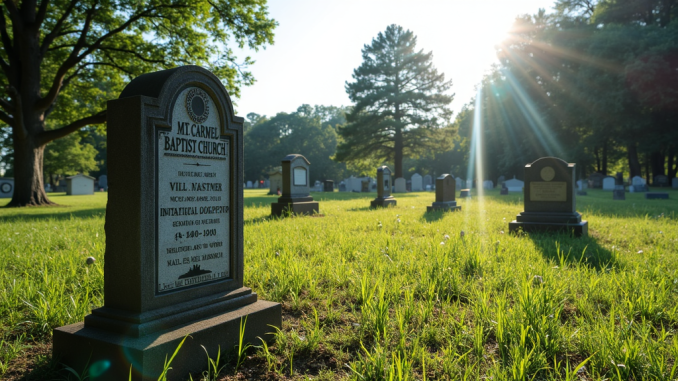The History of Mt. Carmel Baptist Church Cemetery is a captivating journey that begins in 1865, when this hallowed ground was established alongside one of the region’s oldest African American churches. Serving as both a burial site and a historical archive, the cemetery embodies the rich cultural significance of cemeteries in preserving community heritage. This site reflects the resilience and struggles of its members during the post-Civil War era, making it a vital piece of African American church history. As we explore the history of Mt. Carmel cemetery, we will uncover the stories of those interred within its grounds, celebrating their contributions to the community while also examining the recent efforts toward historical cemetery preservation. Join us as we engage with the powerful narratives that continue to shape our understanding of cultural identity and community engagement in history.
The legacy of the Mt. Carmel Baptist Church Cemetery unfolds as a remarkable chapter within African American burial sites, illustrating deep ties to community and heritage. Established to honor the memories of early church members and community leaders, this cemetery plays a crucial role in narrating the stories of struggles and triumphs experienced by its inhabitants. As we navigate through its historical landscape, we will highlight its significance in the broader context of cultural symbolism in burial grounds. This discussion will also include the pressing need for community involvement in its conservation, showcasing how collective efforts can promote understanding and appreciation of our shared past. Discover how the rich tapestry of lives represented at the cemetery reflects a vibrant history that informs our present.
History of Mt. Carmel Baptist Church Cemetery
The Mt. Carmel Baptist Church Cemetery holds a profound place within the historical narrative of the African American community, having been established in 1865 alongside one of the region’s oldest churches. This cemetery is not just a burial site; it symbolizes a rich tapestry of faith, resilience, and community solidarity that emerged in the aftermath of the Civil War. Its inception coincided with a pivotal moment in history when African Americans were beginning to forge their identities amidst societal upheaval. Many prominent figures from the community, including local leaders and foundational families, are interred here, creating a vital link to the past that helps illuminate the struggles and achievements of those who came before us.
Within the grounds of Mt. Carmel Baptist Church Cemetery lie stories that echo through generations. Each grave tells a tale of perseverance, loss, and hope, contributing to an overarching narrative that is essential for understanding African American church history. The cemetery serves as an educational resource that allows descendants to connect with their heritage, fostering an appreciation for the lives of their ancestors. As we explore its history, it becomes evident that the cemetery is a living gallery of historical markers that honor the legacy of a community that has thrived against the odds.
Significance of African American Church History
The significance of Mt. Carmel Baptist Church Cemetery extends beyond its physical boundaries, representing a crucial aspect of African American church history. Churches have traditionally served as focal points for African American communities, providing not only spiritual guidance but also social and cultural support. The congregation at Mt. Carmel has been a beacon of hope and resilience since its founding, with the cemetery standing as a testament to the lives and struggles of its members. It reflects the commitment of these individuals to uphold their cultural heritage and maintain their community through collectively shared faith.
Moreover, the narratives contained within the cemetery enrich our understanding of the African American experience in the U.S. Each headstone represents a life that contributed to the collective legacy of the region, offering insights into social issues, family structures, and community dynamics. By examining the stories of those interred at Mt. Carmel, scholars and community members alike can better appreciate the complex history of African American resilience, highlighting how faith played a pivotal role in shaping cultural identities and community cohesion.
Efforts in Historical Cemetery Preservation
Preserving the Mt. Carmel Baptist Church Cemetery is an important endeavor, reflecting the broader initiatives dedicated to historical cemetery preservation across the nation. These efforts encompass the documentation, restoration, and protection of burial sites that hold intrinsic cultural value. Community members recognize the importance of maintaining the cemetery not only as a place of rest but also as a vessel for historical education. This commitment fosters a deeper connection to the past, inviting future generations to learn about the cultural significance of the site.
Volunteers and local historical societies are at the forefront of these preservation efforts, engaging in activities that include grave restoration, clean-up days, and public awareness campaigns. Each initiative seeks to breathe new life into the cemetery, ensuring that it remains not only accessible but also accurately represents its rich history. By working collaboratively, these groups highlight the importance of safeguarding cultural landmarks that provide insight into the African American experience, thus reinforcing the critical role cemeteries play in preserving community narratives.
Community Engagement in History
Community engagement is a vital component of preserving the history of Mt. Carmel Baptist Church Cemetery. Regular events, such as memorial services and storytelling sessions, invite local residents to participate actively in commemorating their heritage. These gatherings serve as platforms for sharing personal stories and connecting families to their ancestry, fostering a sense of pride and ownership within the community. Such engagement not only strengthens ties among community members but also raises awareness about the historical significance of the cemetery.
Furthermore, the importance of community involvement is underscored by the collective effort to educate outsiders about the cemetery’s rich history. Events like historical tours and educational workshops provide a space for dialogue and learning, allowing broader audiences to appreciate the cultural significance of the site. By bringing together diverse community voices, Mt. Carmel’s legacy continues to thrive, making it a living testament to the persistence and strength of its ancestors.
Cultural Significance of Cemeteries
The cultural significance of Mt. Carmel Baptist Church Cemetery is profound, as it encapsulates the values, traditions, and history of the African American community. Cemeteries are often viewed merely as resting places; however, they serve as essential repositories of cultural memory. The narratives and rituals associated with burials reflect a society’s relationship with death and remembrance, highlighting the community’s resilience even in the face of adversity. This cemetery, in particular, embodies the interconnectedness of faith, memory, and cultural identity.
Additionally, local historians emphasize the importance of commemorating significant events through community-organized memorial activities. These events not only honor the individuals interred within the cemetery but also provide an opportunity for reflection on shared experiences and challenges faced over centuries. The stories that emerge from such gatherings resonate strongly, ensuring that the lives of those who contributed to the community’s foundation are recognized and celebrated, thus reinforcing the cultural significance inherent in the act of remembrance.
Facing Preservation Challenges
Despite ongoing preservation efforts, Mt. Carmel Baptist Church Cemetery faces numerous challenges that threaten its historical integrity. Environmental factors, such as weathering and erosion, adversely affect the headstones and inscriptions, making it increasingly difficult to maintain both the physical site and the legacies it represents. These challenges are compounded by limited funding for restoration projects, as many historical sites compete for scant resources. Addressing these issues requires creative solutions and sustained community support.
To confront these preservation challenges, collaboration among community members, historians, and local organizations is essential. Raising awareness through fundraisers, grant applications, and volunteer days helps draw attention to the importance of maintaining this cultural landmark. As determined individuals and groups continue their efforts to protect Mt. Carmel, they embody the spirit of resilience that the cemetery itself represents, ensuring that the stories contained within are honored and preserved for future generations.
What is the history of Mt. Carmel Baptist Church Cemetery and its significance?
The Mt. Carmel Baptist Church Cemetery was established in 1865 alongside one of the oldest African American churches in the region. It serves as a critical cultural and historical landmark, reflecting the resilience and experiences of the African American community during the post-Civil War era. The cemetery holds the graves of early church members and local leaders, providing a historical framework for understanding the community’s development.
How has the Mt. Carmel Cemetery played a role in African American church history?
Mt. Carmel Baptist Church Cemetery is integral to African American church history as it encapsulates the social and spiritual dynamics of the community from its establishment in 1865. The cemetery is the final resting place of individuals who shaped the church and its mission, highlighting the importance of faith and community in the African American experience.
What preservation efforts are being made for Mt. Carmel Baptist Church Cemetery?
Preservation efforts at Mt. Carmel Baptist Church Cemetery include clean-up days organized by local historical societies and community volunteers. These initiatives involve documenting graves and sharing the stories of those interred, fostering community engagement and awareness about the cemetery’s historical significance.
Why is community engagement important in the history of Mt. Carmel Cemetery?
Community engagement is vital to the history of Mt. Carmel Baptist Church Cemetery as it builds a sense of ownership and pride among locals. Events like storytelling sessions and historical tours encourage dialogue about the cemetery’s cultural significance, allowing descendants and community members to connect with their heritage and ensure that the stories of those buried are not forgotten.
The History of Mt. Carmel Baptist Church Cemetery is a testament to the endurance and spirit of an African American community deeply rooted in faith and resilience. Established in 1865, alongside the church, this cemetery proves to be a significant cultural landmark echoing the struggles and triumphs of its members throughout history. Over the years, it has developed from a simple burial ground into a profound symbol of remembrance, education, and community bonding. Efforts to preserve the cemetery highlight its value, with volunteers and local organizations working tirelessly to maintain its integrity and vibrancy. The ongoing challenges it faces remind us of the importance of community involvement in safeguarding our shared heritage. Through education, storytelling, and active participation, the legacy of those interred at the Mt. Carmel Baptist Church Cemetery continues to inspire and shape future generations.
Discover the power of Autowp, the ultimate AI content generator and AI content creator plugin for WordPress, designed to transform the way you produce content effortlessly. With Autowp, you can generate high-quality articles, blogs, and social media posts in seconds, allowing you to focus on what truly matters—growing your brand. Visit Autowp to explore the endless possibilities and enhance your content strategy today! To remove this promotional paragraph, upgrade to Autowp Premium membership.



Leave a Reply